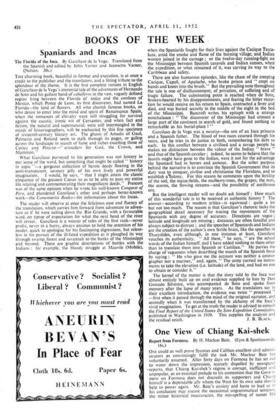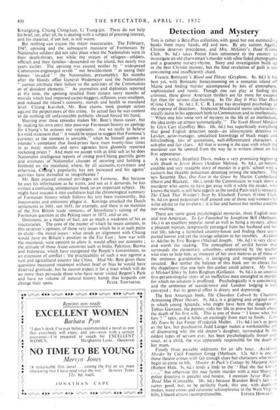One View of Chiang Kai-shek
ONE could as well prove Sycorax and Caliban excellent civil admini- strators as convincingly fulfil the task Mr. Maclear Bate has voluntarily assumed. After forty days on Formosa he has set out to water down the impression, scarcely dispelled by newspaper -reports, that Chiang Kai-shek's regime is corrupt, inefficient and unpopular, as an essential prelnde to his contention that the Govern- ment on Formosa does not discredit its supporters and Chiang himself is a dependable ally whom the West for its own sake should help to power again. Mr. Bate's anxiety and haste to lead us to his conclusion may excuse the occasional ungrammatical sentence, the minor historical inaccuracies, the mis-spelling of names like
Kwangtung, Chiang Ching-kuo, Li Tsung-jen. These do not help his brief, yet, after all, he is dealing with a subject of pressing interest, and his material, if not hot, is still warm.
But nothing can excuse the major inaccuracies. The Feblvary, 1947, uprising and the subsequent massacre of Formosans by Nationalist soldiers did not take place when the Nationalists were in their death-throes, nor while the stream of refugees—soldiers, officials and their families—descended on the island, but nearly two years earlier. The uprising was caused neither by " widespread Communist-engineered revolt " nor bewilderment " at seeing their homes ' invaded ' " (by Nationalists, presumably). Six months after the bloody affair General Wedemeyer said the Nationalists " cannot attribute their failure to the activities of the Communists or of dissident elements." As journalists and diplomats reported at the time, the uprising resulted from sixteen sorry months of misrule which had imported carpet-baggers, inflation, even smallpox, and reduced the island's economy, morals and health to mainland level. Chiang Kai-shek, Mr. Bate claims, took prompt action against the perpetrators of this crime. In actual fact he was content to do nothing till unfavourable publicity abroad forced his hand.
Slurring over these episodes makes Mr. Bate's thesis easier, but 113 making his own entry into post-war Formosan history an apology for Chiang's he arouses our suspicions. Are we really to believe hIs mild statement that " it would be unjust to suggest that Formosa's currency at the moment is unstable," when he himself quotes an islander's complaint that food-prices have risen twenty-four times in as many months and news agencies have gloomily reported rocketing prices ? And must we accept with as little salt as he does Nationalist intelligence reports of strong pro-Chiang guerrilla gains and estimates of Nationalist chances of securing and holding a foothold on the mainland, where, by all accounts, eyewitness and otherwise, Chilang's popularity has not increased and his agents' activities have dwindled to insignificance ?
Mr. Bate enjoyed unusual privileges on Formosa. But because he uses his information as he wants, and not as it demands, he has written a confusing, unimportant book on an important subject. He might have rescued it into usefulness had the chronological summary of Formosan history which follows his text been trustworthy, but inaccuracies and omissions plague it. Koxinga attacked the Dutch settlements in 1661, not 1651, for example, and there is no mention of the first British trade ventures, of Soyeshima's raising of the Formosan question at the Peking court in 1873, and so on. Omissions, as a matter of fact, are as much a weakness of his as inaccuracies. The core of the matter of which he treats consists, in this reviewer's opinion, of those very issues which he is at such pains to elude—the moral issues : what result an alignment with Chiang would have on Britain's position in the Far East ; how war with the mainland, were opinion to allow it, would affect our economy ; the attitude of those Asian countries such as India, Pakistan, Burma and Indonesia, which have recognised the People's Government, to an extension of conflict ; the practicability of such a war against a vast and agricultural country like China. Had Mr. Bate given these questions measured treatment without brief or bias he would have de.served gratitude, but he cannot expect it for a tract which will do no more than persuade those who have never visited Regent's Park and have no volume of natural history handy that leopards can



































 Previous page
Previous page